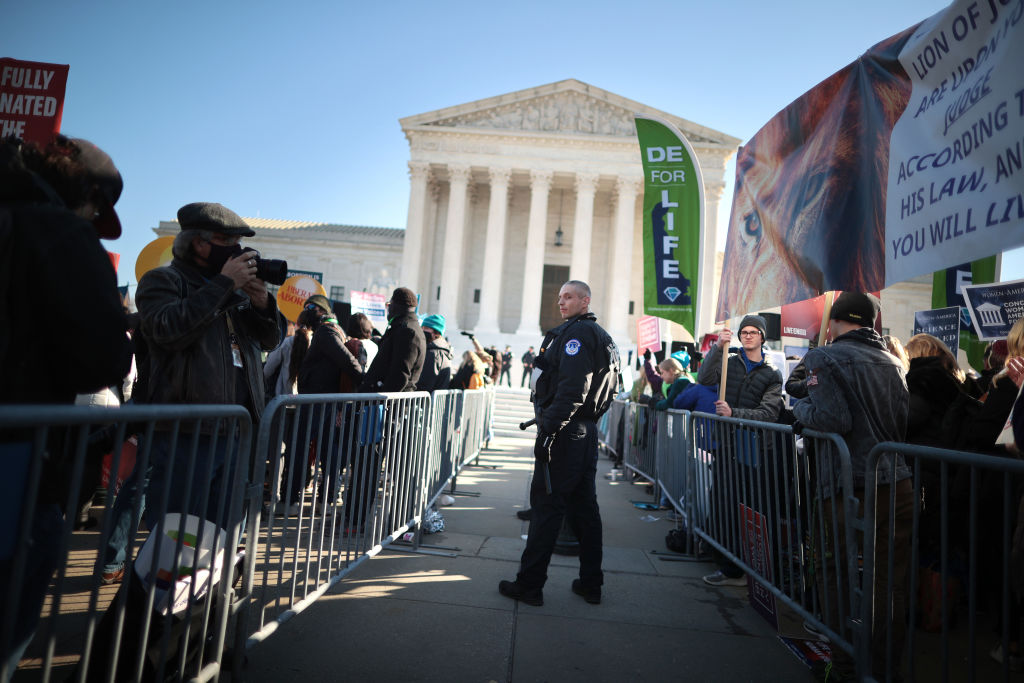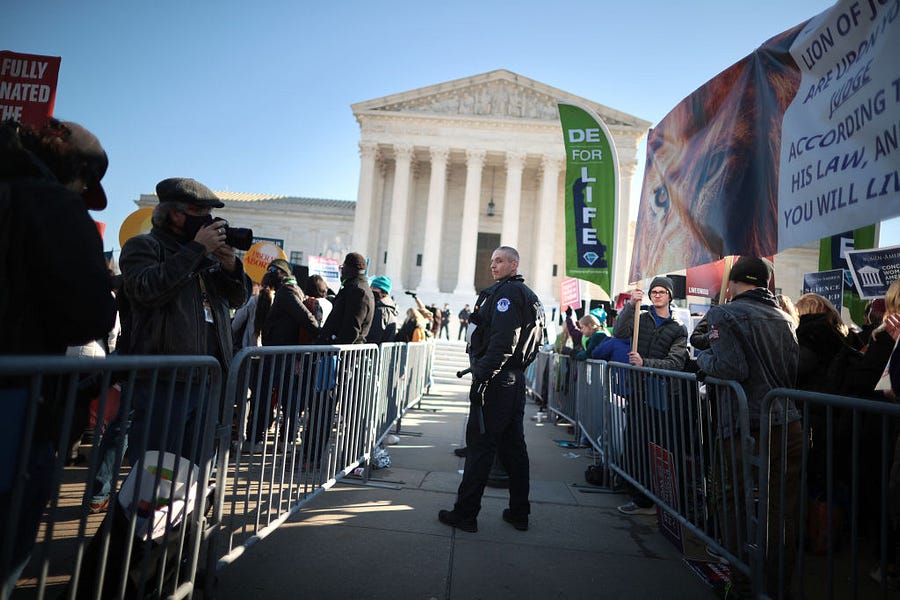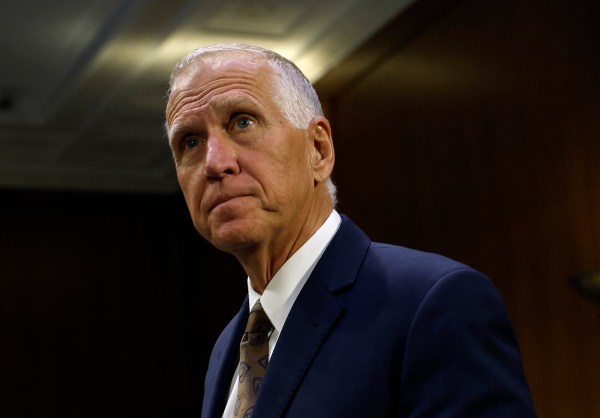Happy Thursday! We regret to inform you that the ninth work stoppage in Major League Baseball has officially begun after ownership and the players’ union failed to come to terms on a new collective bargaining agreement. Here’s hoping they figure it all out by Opening Day!
Quick Hits: Today’s Top Stories
-
Democrats and Republicans did not come to an agreement on a short-term continuing resolution on Wednesday, leaving lawmakers with less than 48 hours to work out a deal before the government shuts down Friday at midnight. A group of GOP officials have expressed interest in shutting the government down over the Biden administration’s COVID-19 vaccine mandates, but several party leaders pushed back on the idea yesterday. “I think we’re going to be okay,” Senate Minority Leader Mitch McConnell told reporters.
-
The Centers for Disease Control announced Wednesday that the first confirmed U.S. case of the Omicron COVID-19 variant was detected in California in a person who had returned from South Africa on November 22, adding that the individual “had mild symptoms that are improving.” The CDC issued a directive requiring airlines to provide the public health agency with the names and contact information of passengers arriving in the United States after November 29 from several countries in southern Africa.
-
Women’s Tennis Association CEO Steve Simon announced Wednesday that the organization is immediately suspending all tournaments in China and Hong Kong in light of what he deemed the Chinese Communist Party’s (CCP) continued censorship of Peng Shuai and her sexual assault allegation against a former CCP leader. “Unless China takes the steps we have asked for, we cannot put our players and staff at risk by holding events in China,” he said.
-
U.S. District Judge Robert Pitman on Wednesday night granted a preliminary injunction blocking a Texas law seeking to ban “viewpoint discrimination” on social media platforms. “Social media platforms have a First Amendment right to moderate content disseminated on their platforms,” the judge wrote.
-
Russia on Wednesday ordered some longer-tenured U.S. Embassy staff in Moscow to leave the country by the end of January 22, likely in retaliation for the United States’ expulsion of several Russian diplomats earlier this year. Secretary of State Antony Blinken is set to meet with Russian Foreign Minister Sergey Lavrov at a summit in Stockholm on Thursday.
-
Rep. Peter DeFazio of Oregon announced Wednesday he will not seek reelection in 2022 after serving 36 years in the House of Representatives. He is the 19th House Democrat this year to announce that he’s leaving Congress to retire or seek another office.
-
Moderate Republican Gov. Charlie Baker of Massachusetts also announced Wednesday he will not seek a third term in 2022, saying he believes it’s “most important that we spend the next year focusing on [recovering from the pandemic], and not focusing on, let’s call it the discourse—and that’s probably an insult to the word discourse—that comes with political campaigning.”
-
Stacey Abrams—progressive activist and former minority leader in the Georgia House of Representatives—announced Wednesday she is joining Georgia’s 2022 gubernatorial race. Abrams was the Democratic nominee for governor in 2018, and lost to now-Gov. Brian Kemp by about 55,000 votes.
The End of Roe v. Wade?

When the Supreme Court agreed back in May to review Dobbs v. Jackson Women’s Health Organization, both pro-life and pro-choice Americans held their collective breaths—the former in tentative anticipation and the latter in anxious dread. “The Supreme Court just took a case that poses a major threat to Roe v. Wade,” a Vox headline from that day read.
In a literal sense, Dobbs v. Jackson concerns the constitutionality of Mississippi’s Gestational Age Act, a law enacted by the state’s Republican legislature and governor in 2018 that prohibits a person from performing abortions after 15 weeks of gestation “except in a medical emergency or in the case of a severe fetal abnormality.” A federal court immediately blocked the legislation from going into effect on the grounds it contradicts judicial precedent established in Roe v. Wade and Planned Parenthood v. Casey—which is precisely why the case ended up before the Supreme Court.
Nearly two hours of oral arguments over the case took place at the Supreme Court Wednesday morning, but the stakes were clear within minutes of the proceedings’ outset. “Roe v. Wade and Planned Parenthood v. Casey haunt our country,” Mississippi Solicitor General Scott Stewart told the court. “They have no basis in the Constitution. They have no home in our history or traditions. They’ve damaged the democratic process. They’ve poisoned the law. They’ve choked off compromise.”
In passing the Gestational Age Act, Mississippi lawmakers weren’t merely trying to tighten existing restrictions in the state by a handful of weeks; they were endeavoring to upend decades of legal precedent that has governed abortion law in the United States for half a century. And judging by what transpired in the courtroom yesterday, it may just work.
“The Supreme Court seems poised to overturn Roe v. Wade,” Noah Feldman—Harvard Law School professor and former clerk for Justice David Souter—concluded at the end of Wednesday’s arguments. Veteran watchers of the court were keyed in on its two newest members—Justices Brett Kavanaugh and Amy Coney Barrett—each of whom laid down plenty of hints.
“Why should this court be the arbiter rather than Congress, the state legislatures, state supreme courts, the people being able to resolve this?” Kavanaugh said, noting that, in Mississippi’s view, the Constitution is neither pro-life nor pro-choice. “There will be different answers in Mississippi and New York, different answers in Alabama than California because they’re two different interests at stake and the people in those states might value those interests somewhat differently. Why is that not the right answer?”
U.S. Solicitor General Elizabeth Prelogar—arguing in support of Jackson Women’s Health Organization—disagreed with that reasoning. “It’s not the right answer because the court correctly recognized that this is a fundamental right of women,” she said. “The nature of fundamental rights is that it’s not left up to state legislatures to decide whether to honor them or not.”
But that explanation seemed to fall on deaf ears with a majority of the court. “Kavanaugh came out very strongly for, as he put it, ‘getting the court out of abortion, sending it back to the states, expressing neutrality, neither pro nor con,’” Ilya Shapiro—director of the Cato Institute’s Robert A. Levy Center for Constitutional Studies—told The Dispatch. “Much more than people probably were expecting him to.”
Kavanaugh—alongside Barrett and Chief Justice John Roberts—has carved out a reputation on the Supreme Court as one of its more institutionalist justices, concerned about the perception and legitimacy of the body in addition to his own judicial philosophy. And the court’s more liberal members on Wednesday made no bones about appealing to that instinct of his.
“The newest ban that Mississippi has put in place, the six-week ban, the Senate sponsor said ‘We’re doing it because we have new justices on the Supreme Court,’” Justice Sonia Sotomayor said. “Will this institution survive the stench that this creates in the public perception that the Constitution and its reading are just political acts?”
Conservative legal scholars scoffed at the suggestion. “Nothing hurts the court’s legitimacy more than a decision like Roe vs. Wade, in which the court ignored the Constitution and announced a new national policy because the court wanted to,” said Thomas Jipping, senior fellow at the Edwin Meese III Center for Legal and Judicial Studies at the Heritage Foundation. “Every justice believes that, in general, courts should follow their past decisions. And no justice believes that the court should always do so. The question is, when should an incorrect decision or precedent be overruled? That’s the issue. So to suggest that overruling a precedent will somehow make the court look political—really? Did the court look ‘political’ in Brown v. Board of Education?”
Brown v. Board—the 1954 decision that rendered segregation in public schools unconstitutional—came up a lot on Wednesday, as the outcome of Dobbs v. Jackson will hinge on the justices’ interpretation of stare decisis, a Supreme Court doctrine that dictates justices should generally “stand by things already decided.”
“I don’t think anyone disputes [the benefits of stare decisis], and, of course, no one can dispute because it’s part of our stare decisis doctrine,” Barrett said yesterday. But she noted that it’s not an “inexorable” command. “There are some circumstances in which overruling is possible.”
“If you think about some of the most important cases, the most consequential cases in this court’s history, there’s a string of them where the cases overruled precedent,” Kavanaugh added later, referencing the court’s outlawing of “separate but equal,” its recognition of a constitutional right to same-sex marriage, and its guaranteeing of a right to counsel in criminal cases, among other decisions. “[Justices] were presented with arguments in those cases, ‘Adhere to precedent in Brown v. Board, adhere to Plessy, on West Coast Hotel, adhere to Atkins and adhere to Lochner.’ And if the court had done that in those cases, the country would be a much different place.”
Julie Rikelman, the advocate for Jackson Women’s Health Organization, argued that believing a given precedent is simply wrong has never proven sufficient grounds for overturning it. “Instead, the court has required something else, a special justification,” she said. “And the state doesn’t come forward with any special justification. It makes the same exact arguments the court already considered and rejected in its stare decisis analysis in Casey.”
Rikelman spent her time Wednesday urging justices to uphold Roe and Casey in their entirety while Stewart pushed for the decisions to be completely overturned, but the court could theoretically take a third, more nuanced approach, by upholding Mississippi’s law but not entirely overturning Casey. While Roe had established a framework that prohibited abortion restrictions in the first trimester but allowed states to regulate the procedure later in pregnancy, Casey said that states could regulate abortion at the point of viability. It also established an “undue burden” standard, prohibiting regulations that are too restrictive of a woman’s right to abortion.
“The Supreme Court can definitely rule in favor of Mississippi by eliminating the viability standard in Casey, but without necessarily renouncing the undue burden standard altogether and leaving future issues for future cases,” Adam White—a constitutional scholar at the American Enterprise Institute who served on President Biden’s Supreme Court Commission—told The Dispatch. “I came to the court expecting that that’s where the majority will take this, and after hearing oral argument, I still feel that that seems the most likely outcome.”
Chief Justice Roberts tried to walk this middle path, asking why the court couldn’t draw a line at 15 weeks rather than fetal viability, which comes at around 24 weeks. “If you think that the issue is one of choice—that women should have a choice to terminate their pregnancy—that supposes that there is a point at which they’ve had the fair choice,” he said. “And why would 15 weeks be an inappropriate line? Viability, it seems to me, doesn’t have anything to do with choice. But if it really is an issue about choice, why is 15 weeks not enough time?”
Shapiro predicted such an outcome would satisfy no one. “If they replace what they’re going to say is a hard-to-apply undue burden standard with something else that’s also hard to apply, inscrutable, how is that an improvement?” he said. “[You’d have] everyone mad at you rather than just half the people.”
A final ruling is expected next June or July, and tensions will be high no matter the outcome. Democratic Sen. Jeanne Shaheen on Monday warned the Supreme Court there would be a “revolution” led by young people if the body reversed Roe v. Wade, and the more populist segments of the right are gearing up for a clash with the GOP establishment in the event the decision doesn’t go their way.
“If they uphold Roe, or if it’s not a big enough victory for Mississippi, then the Federalist Society and the conservative legal movement will be discredited, and what will replace it?” Shapiro said. “If this is, again, Lucy taking away the football, then I think the Josh Hawleys of the world, the common good constitutionalism types, [Harvard Law School Professor Adrian] Vermeule, etc., they’re going to get a lot of traction. … That’s obviously a concern for Barrett and Kavanaugh.”
In a July French Press, David argued “there’s a strong argument that overruling Roe could—after a period of shock and rage in progressive America—actually help depolarize America.”
“By returning the abortion question to states,” he wrote, “overturning Roe could de-escalate national politics, de-escalate the judicial nomination wars, and perhaps cause voters to focus more on political races closer to home.”
Worth Your Time
-
Would breaking up Facebook—er, Meta—actually accomplish what its proponents are hoping it would? That’s the topic of yesterday’s “Argument” podcast with Jane Coaston, Sarah Miller, and Tyler Cowen. “There’s a resurgence of interest in using antitrust, and in today’s environment, it’s both the left wing and the right wing that don’t like Facebook,” Cowen notes. “But they dislike it for somewhat opposite reasons. In my view, that’s actually a sign you’re doing something right. The right wing thinks there’s too many left-wing employees at Facebook who discriminate against the right. The left wing thinks there’s too much misinformation on Facebook, too many right wing lies. They’re upset about that.”
-
In his new Atlantic newsletter, Derek Thompson argues that American innovation and ingenuity is running on fumes. “Today’s scientists are less likely to publish truly new ideas, businesses are struggling to break into the market with new ideas, U.S. immigration policy is constricting the arrival of people most likely to found companies that promote new ideas, and we are less likely than previous generations to build institutions that advance new ideas,” he writes.
-
A few days ago, a bunch of news reports started cropping up about a couple dozen bar patrons in Yorkshire, England, being trapped in the bar with an Oasis cover band by a snowstorm over the weekend. Matt Labash found the phenomenon fascinating, in a way only he can. “It was hard not to be struck by how many media outlets, and people generally, were enchanted by a simple snow-in story,” he writes in his latest Slack Tide post. “Even with our recent COVID speed bump, have our lives now become so fast, that nature grabbing us by the scruff of our necks and stopping those lives for a while—with all their schedules and obligations and pressing concerns—fills us with both joy and envy, the latter of which is often a joy aspirant? It left me clinging to an old suspicion: that if you spend enough time in the world, there is something every bit as attractive in escaping it as there is in inhabiting it.”
Something Fun
Presented Without Comment
Also Presented Without Comment
Toeing the Company Line
-
In Wednesday’s G-File (🔒), Jonah has some advice for today’s youth before turning to the problems with celebrating victimhood. “Finding your ‘identity is not synonymous with finding happiness. I think real happiness comes from multiple identities, and I don’t mean people like Sybil. You’re only partly what you do. You’re also the person(s) your friends and family know. You’re what you do when you’re not working, too.”
-
The whole gang is back together once again on this week’s Dispatch Podcast! Tune in for a riveting discussion of Jackson v. Dobbs, the Omicron variant, Russia’s military buildup along its border with Ukraine, and Democratic-led states’ failure to live up to their own ideals.
-
With the end of the year fast approaching, Congress has a lot on its plate. The annual National Defense Authorization Act has been stuck in limbo for three days, as senators use the must-pass legislation as a political football amid ongoing debates over its amendments. Senate Majority Leader Chuck Schumer has been unsuccessful in pushing the NDAA through the upper chamber. Charlotte and Audrey have a rundown on all the latest developments over on the site today.
Let Us Know
Do you agree with David’s hope on Dobbs v. Jackson that, by overturning Roe v. Wade and returning the abortion question to the states, the Supreme Court “could—after a period of shock and rage in progressive America—actually help depolarize America?”
Reporting by Declan Garvey (@declanpgarvey), Andrew Egger (@EggerDC), Charlotte Lawson (@lawsonreports), Audrey Fahlberg (@AudreyFahlberg), Ryan Brown (@RyanP_Brown), Harvest Prude (@HarvestPrude), and Steve Hayes (@stephenfhayes).







Please note that we at The Dispatch hold ourselves, our work, and our commenters to a higher standard than other places on the internet. We welcome comments that foster genuine debate or discussion—including comments critical of us or our work—but responses that include ad hominem attacks on fellow Dispatch members or are intended to stoke fear and anger may be moderated.
With your membership, you only have the ability to comment on The Morning Dispatch articles. Consider upgrading to join the conversation everywhere.